Passage - I
A bicycle has pedal rods of length 16 cm connected to a sproketed disc of radius 10cm. The bicycle wheels are 70 cm in diameter and the chain runs over a gear of radius 4 cm. The speed of the cycle is constant and the cyclist applies 100 N force that is always perpendicular to the pedal rod, as shown, Assume tension in the lower part chain negligible. The cyclist is pedding at a constant rate of two revolutions per second. Assume that the force applied by other foot is zero when one foot is exerting 100 N force. Ngelect friction within cycle parts & the rolling friction.
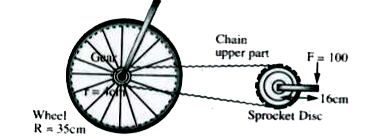
The tension in the upper portion of the chain is equal to
100 N
120 N
160 N
240 N
The correct Answer is:C
Topper's Solved these Questions
- ROTATIONAL DYNAMICS BOOK - AAKASH SERIESCHAPTER - ROTATIONAL DYNAMICS EXERCISE - PRACTICE SHEET (ADVANCED) Matrix Matching Type Questions
2 Videos
- ROTATIONAL DYNAMICS BOOK - AAKASH SERIESCHAPTER - ROTATIONAL DYNAMICS EXERCISE - PRACTICE SHEET (ADVANCED) Integer Type Questions
7 Videos
- ROTATIONAL DYNAMICS BOOK - AAKASH SERIESCHAPTER - ROTATIONAL DYNAMICS EXERCISE - PRACTICE SHEET (ADVANCED) More than One correct answer Type Questions
15 Videos
- RIVISION EXERCISEBOOK - AAKASH SERIESCHAPTER - RIVISION EXERCISEEXERCISE - MOTION IN A PLANE (LAMNI.S THEOREM)
6 Videos
- ROTATIONAL MECHANICSBOOK - AAKASH SERIESCHAPTER - ROTATIONAL MECHANICSEXERCISE - Questions for Descriptive Answers
20 Videos
Similar Questions
A bicycle has pedal rods of length 16cm connected to sprocketed disc of radius 10cm. The bicycle wheels are 70cm in diameter and the chain runs over a gear of radius 4cm. The speed of the cycle is constant and the cyclist applies 100N for, that is always perpendicular to the pedal rod, as shown in figure. Assume tension in the lower part of chain is negligible. The cyclist is peddling at a constant rate of two revolutions per second. Assume that the force applied by other foot is zero when one foot is exerting 100N force. Neglect friction within cycle parts and the rolling friction.
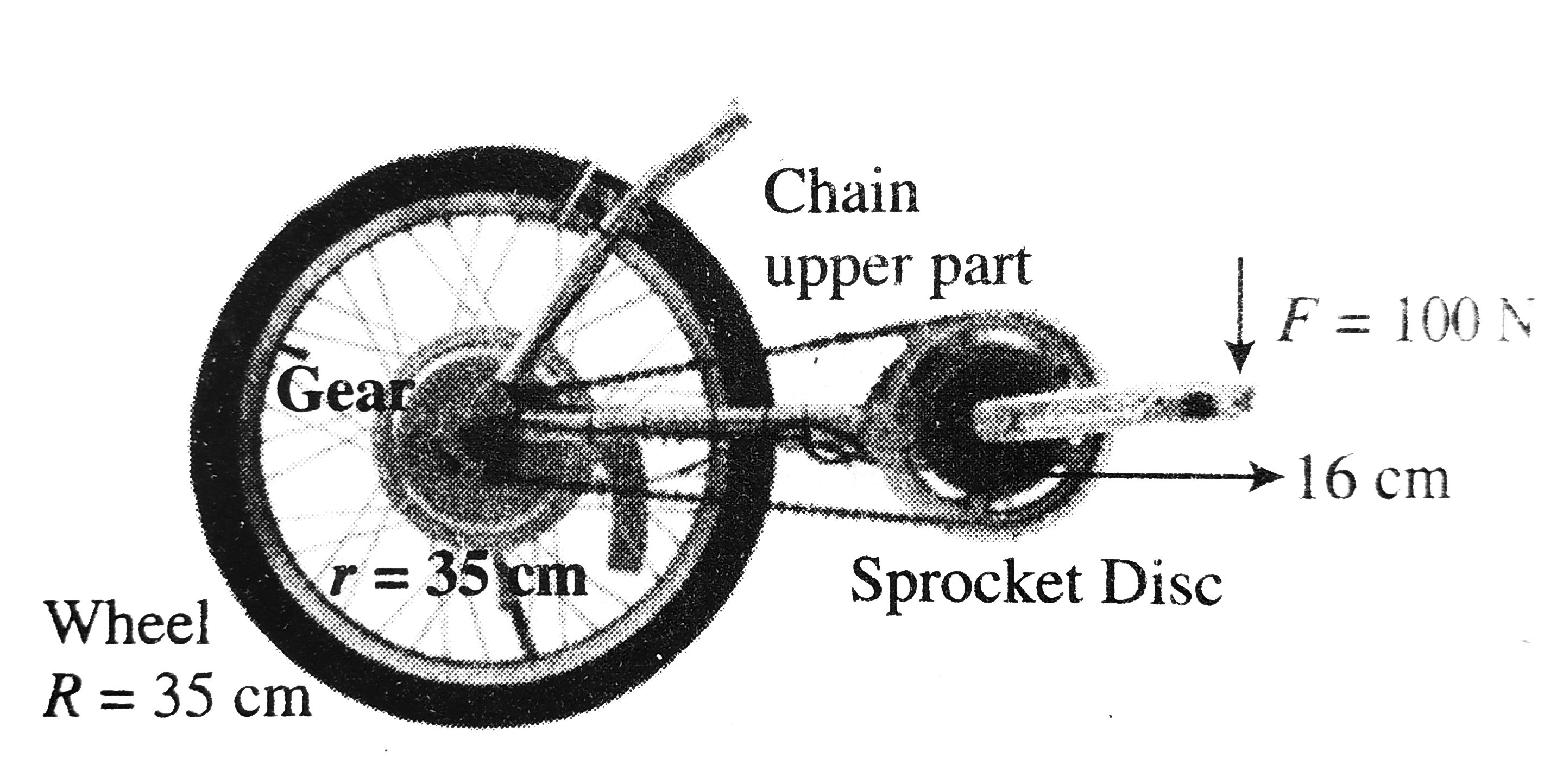
The tension in the upper portion of the chain is equal to
View SolutionA bicycle has pedal rods of length 16cm connected to sprocketed disc of radius 10cm. The bicycle wheels are 70cm in diameter and the chain runs over a gear of radius 4cm. The speed of the cycle is constant and the cyclist applies 100N for, that is always perpendicular to the pedal rod, as shown in figure. Assume tension in the lower part of chain is negligible. The cyclist is peddling at a constant rate of two revolutions per second. Assume that the force applied by other foot is zero when one foot is exerting 100N force. Neglect friction within cycle parts and the rolling friction.
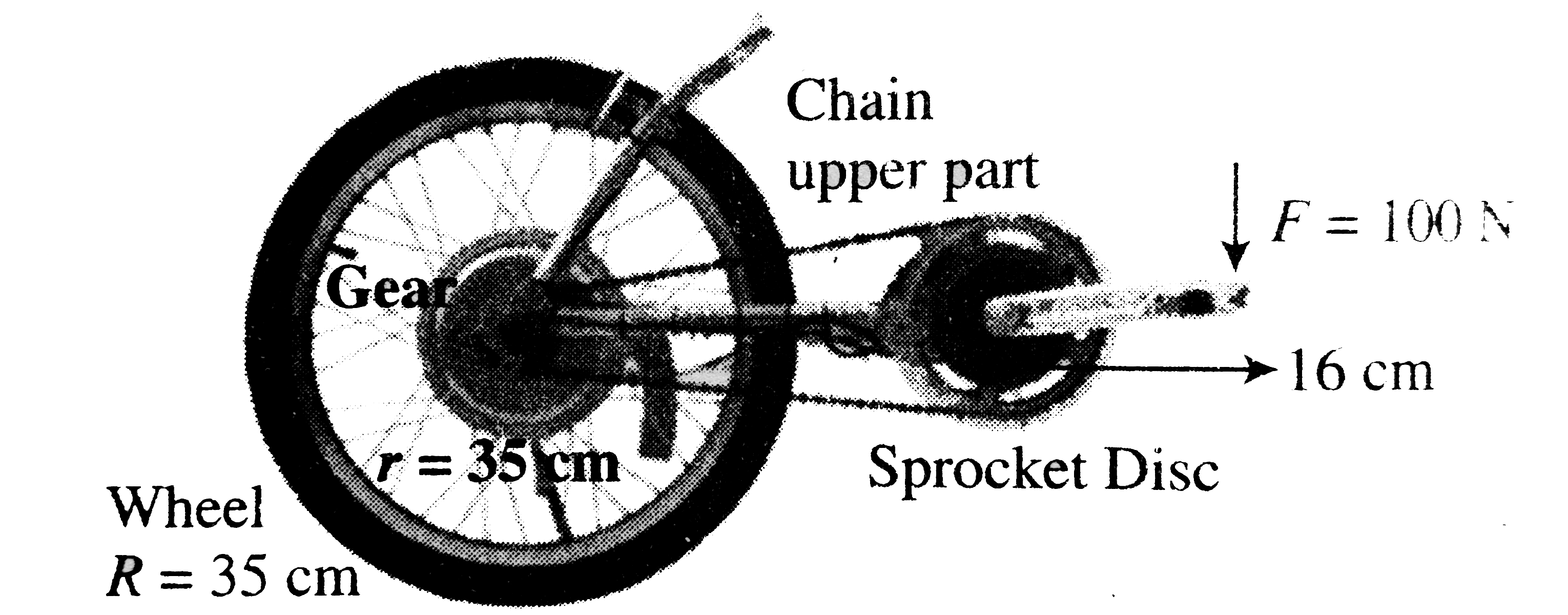
The speed of the bicycle is
View Solution
Knowledge Check
A bicycle has pedal rods of length 16cm connected to sprocketed disc of radius 10cm. The bicycle wheels are 70cm in diameter and the chain runs over a gear of radius 4cm. The speed of the cycle is constant and the cyclist applies 100N for, that is always perpendicular to the pedal rod, as shown in figure. Assume tension in the lower part of chain is negligible. The cyclist is peddling at a constant rate of two revolutions per second. Assume that the force applied by other foot is zero when one foot is exerting 100N force. Neglect friction within cycle parts and the rolling friction.

The tension in the upper portion of the chain is equal toA100NB120NC160ND240NA bicycle has pedal rods of length 16cm connected to sprocketed disc of radius 10cm. The bicycle wheels are 70cm in diameter and the chain runs over a gear of radius 4cm. The speed of the cycle is constant and the cyclist applies 100N for, that is always perpendicular to the pedal rod, as shown in figure. Assume tension in the lower part of chain is negligible. The cyclist is peddling at a constant rate of two revolutions per second. Assume that the force applied by other foot is zero when one foot is exerting 100N force. Neglect friction within cycle parts and the rolling friction.
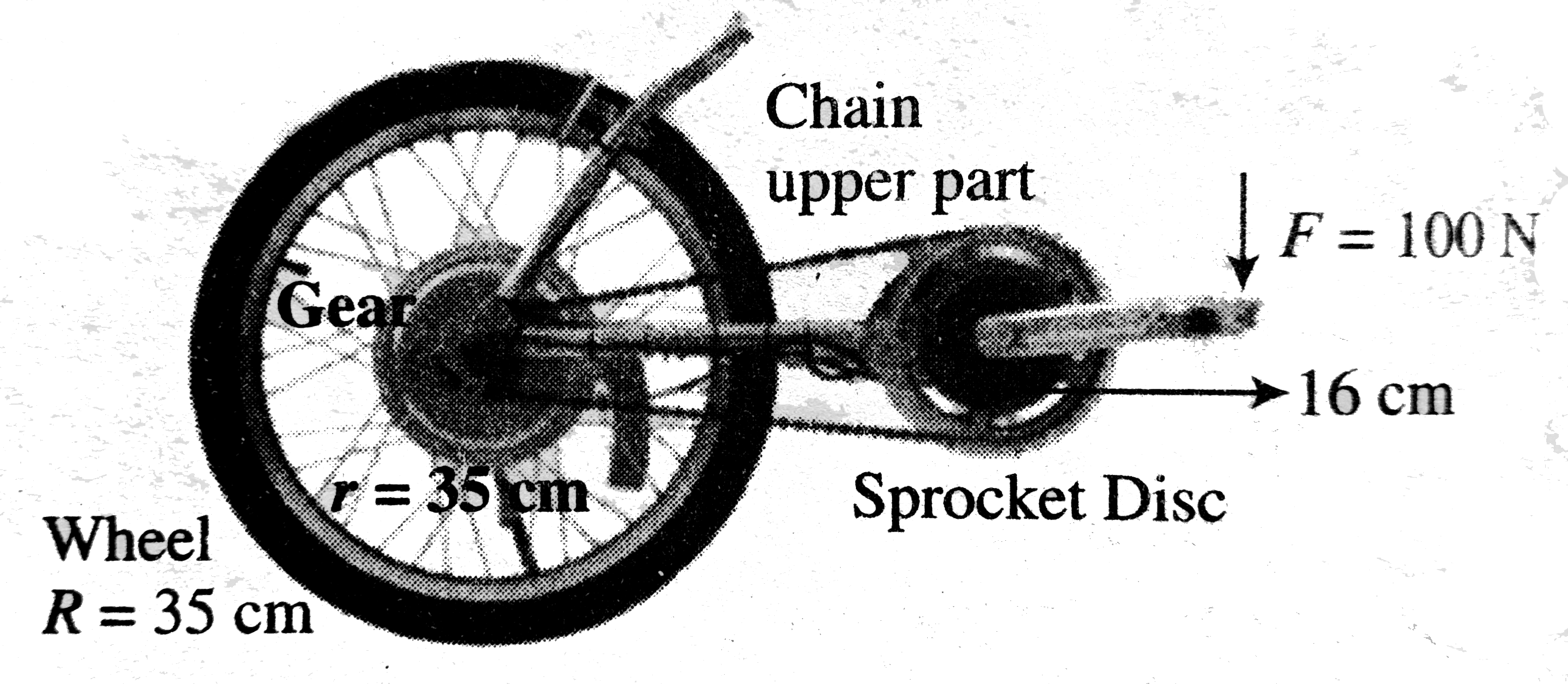
Net torque on the rear wheel of the bicycle is equal toAzeroB16NmC6.4N−mD4.8N−mA bicycle has pedal rods of length 16cm connected to sprocketed disc of radius 10cm. The bicycle wheels are 70cm in diameter and the chain runs over a gear of radius 4cm. The speed of the cycle is constant and the cyclist applies 100N for, that is always perpendicular to the pedal rod, as shown in figure. Assume tension in the lower part of chain is negligible. The cyclist is peddling at a constant rate of two revolutions per second. Assume that the force applied by other foot is zero when one foot is exerting 100N force. Neglect friction within cycle parts and the rolling friction.

The speed of the bicycle isA6.4πms−1B3.5πms−1C2.8πms−1D6.5πms−1
A bicycle has pedal rods of length 16cm connected to sprocketed disc of radius 10cm. The bicycle wheels are 70cm in diameter and the chain runs over a gear of radius 4cm. The speed of the cycle is constant and the cyclist applies 100N for, that is always perpendicular to the pedal rod, as shown in figure. Assume tension in the lower part of chain is negligible. The cyclist is peddling at a constant rate of two revolutions per second. Assume that the force applied by other foot is zero when one foot is exerting 100N force. Neglect friction within cycle parts and the rolling friction.
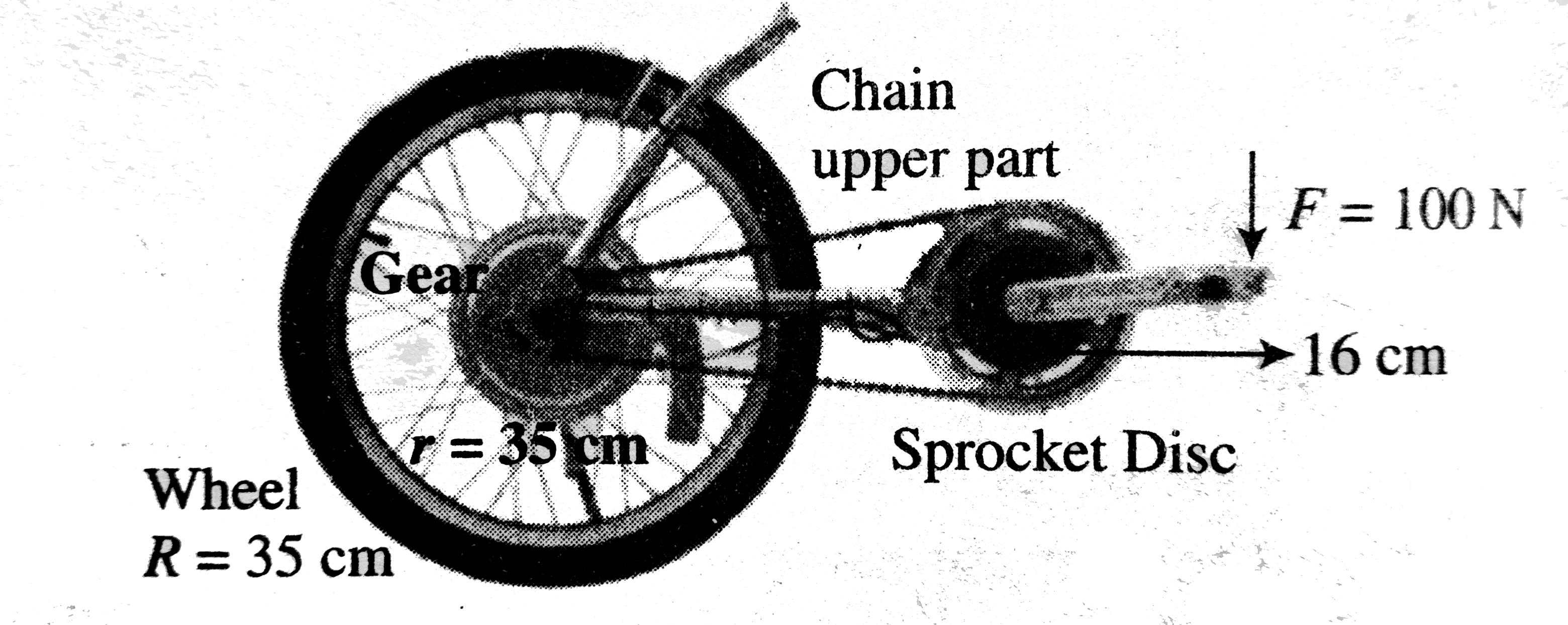
The power delivered by the cyclist is equal to
View SolutionA bicycle has pedal rods of length 16cm connected to sprocketed disc of radius 10cm. The bicycle wheels are 70cm in diameter and the chain runs over a gear of radius 4cm. The speed of the cycle is constant and the cyclist applies 100N for, that is always perpendicular to the pedal rod, as shown in figure. Assume tension in the lower part of chain is negligible. The cyclist is peddling at a constant rate of two revolutions per second. Assume that the force applied by other foot is zero when one foot is exerting 100N force. Neglect friction within cycle parts and the rolling friction.
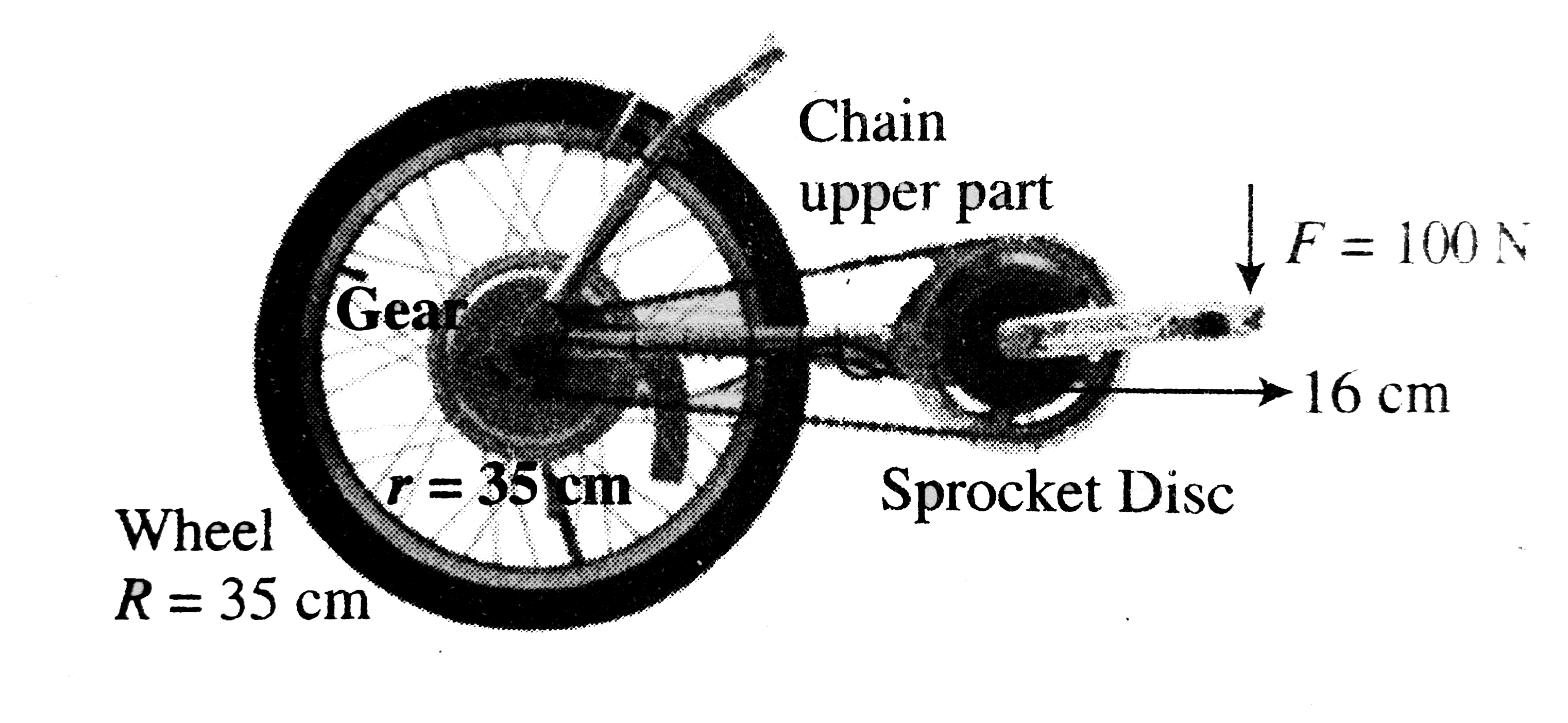
The net force of the friction on the rear wheel due to the road is:
View SolutionA wheel of a bicycle has inner diameter 50 cm and thickness 10 cm. What is the speed of the bicycle if it makes 10 revolutions in 5 seconds?
View SolutionA bicycle has pedal rods of length 16cm connected to sprocketed disc of radius 10cm. The bicycle wheels are 70cm in diameter and the chain runs over a gear of radius 4cm. The speed of the cycle is constant and the cyclist applies 100N for, that is always perpendicular to the pedal rod, as shown in figure. Assume tension in the lower part of chain is negligible. The cyclist is peddling at a constant rate of two revolutions per second. Assume that the force applied by other foot is zero when one foot is exerting 100N force. Neglect friction within cycle parts and the rolling friction.

The power delivered by the cyclist is equal to
View SolutionA bicycle has pedal rods of length 16cm connected to sprocketed disc of radius 10cm. The bicycle wheels are 70cm in diameter and the chain runs over a gear of radius 4cm. The speed of the cycle is constant and the cyclist applies 100N for, that is always perpendicular to the pedal rod, as shown in figure. Assume tension in the lower part of chain is negligible. The cyclist is peddling at a constant rate of two revolutions per second. Assume that the force applied by other foot is zero when one foot is exerting 100N force. Neglect friction within cycle parts and the rolling friction.

The net force of the friction on the rear wheel due to the road is:
View Solution
